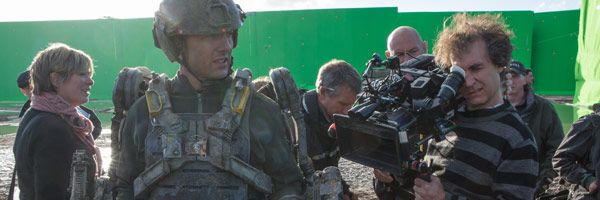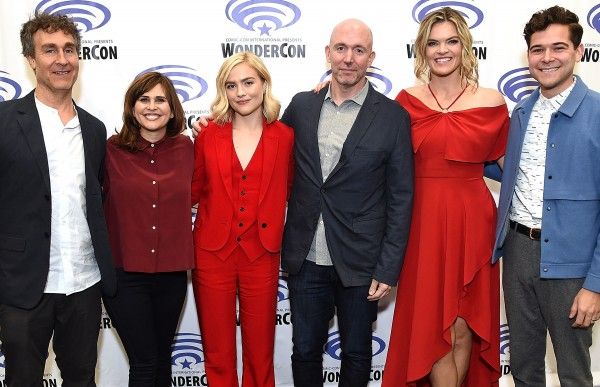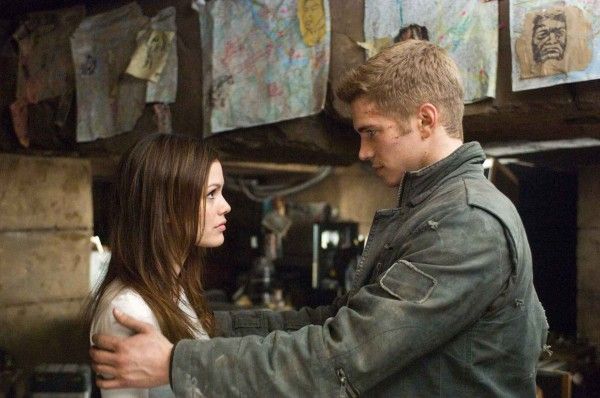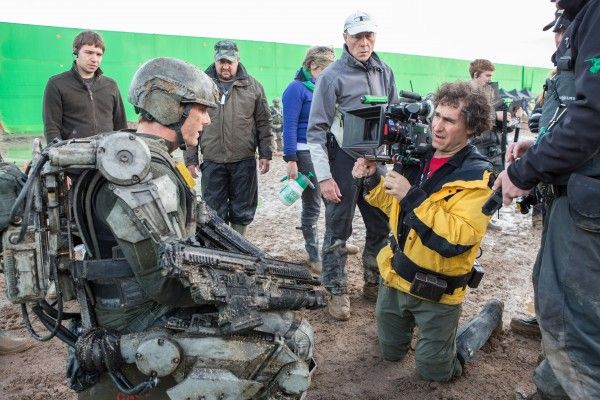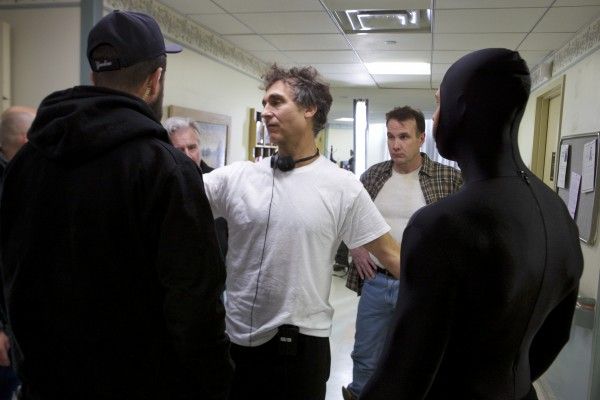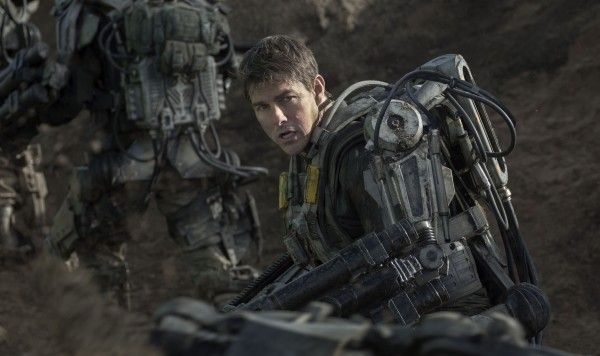From executive producer Doug Liman and Gene Klein and showrunner Lauren LeFranc, the upcoming YouTube Red original series Impulse (set in the world of Jumper) features a rebellious 16-year-old girl named Henry (Maddie Hasson), who has always felt different and longed to escape her small town. In the action thriller, she soon discovers she has the extraordinary ability to teleport, confirming that she really is different from everybody else, but that comes with its own set of problems, as people want to control her.
While at WonderCon to promote the series, debuting this summer, pilot director Doug Liman stopped by the Collider interview suite to chat about why he wanted to jump back into the world of Jumper, but in a new and different way, why he feels Jumper didn’t work, the appeal of putting characters in outrageous situations, being able to go much further and deeper on television, rewriting the lead character once they cast Maddie Hasson, and what makes Henry such a strong character. Liman also talked about hoping to find out the status of the Edge of Tomorrow sequel soon and where they’re at with the script, as well as why Justice League Dark didn’t work out.
Collider: You’ve said you wanted to jump back into this world again because you felt like you didn’t get it right the first time? So, why was Impulse the specific story in the series that made you want to do this, instead of a direct sequel or something else?
DOUG LIMAN: I really wanted a clean start. The themes that attracted me to Impulse are themes that attracted me to Jumper, and even some of my other films. I’m very interested in superpowers and in putting characters in outrageous situations, of any form, whether it’s Mr. & Mrs. Smith and having spouses who are pulling machine guns on each other, or giving a character the ability to teleport, as a way to explore a character. At the end of the day, I like big, high concepts, but I like them because I like following characters going through them. I wasn’t interested in the aliens in Edge of Tomorrow: Live Die Repeat, I was interested in Tom Cruise’s character, having to go through that. With the specific power of teleportation, I missed, in Jumper, what would make it so compelling, in a movie or a TV series, which is the ways in which it could be a curse. And so, in Impulse, not to give too much away, but she only has the ability to come back home, for quite a bit of time. And for somebody who doesn’t want to be at home, and who wants to be anywhere but in Reston New York, it’s a curse that she keeps getting sent back there. That’s way more fun to explore, on a character level, than the you can go anywhere, at any time, concept of Jumper.
When did you realize that Jumper wasn’t what you had hoped it would be?
LIMAN: Honestly, when I was making the film. I’m a contrarian. There’s the way everybody does it, and my instant reaction is, “I’m gonna do it differently.” And so, when I was making Jumper, I said that my version of a superhero film would be that the person doesn’t become a superhero. They have a superpower, but they use the power to save themselves, at the end of the movie, and not to save the damsel in distress. I thought that would be interesting, in the same way The Bourne Identity took what was in the spy genre, and just threw it out the window. And then, you end up in these moments, where you paint yourself into a corner and it’s hard to get out of because you start to realize that these clichés exist because they work, and you’ve intentionally cut off a known thing that works to do something experimental. In the case of The Bourne Identity, it worked out, and in most of my films, it’s worked out. In the case of Jumper, when I first showed it to the studio, they both loved the movie and they said, “You can’t release the movie like this because audiences will flip out. You just can’t have your hero do something selfish in the finale of the movie.” And I believed them. And I still believe them. I believe that what I had done was a gimmick. Maybe I was too cavalier about it. You can not deliver what an audience expects and deliver something radically different, but it better be equal to or better than what they expected. This committed the cardinal sin of just being different, but not as satisfying. I really didn’t have a Plan B, and I didn’t have a supportive environment, in which to figure out how to problem solve. We gave it a more conventional ending, and it lost a reason to exist, for me. So, at the time, I said, “This isn’t a read I want to go back to.”
Do you feel like you already have that satisfaction that you didn’t have, or is it a little bit different when you do a TV series and it’s more ongoing than just telling a full story in the season?
LIMAN: No, I have it. The first season is like a big, long movie and I, for sure, have it. The reality is that, within television, there’s an environment that’s more open to pushing boundaries. In movies, I’ve always been the contrarian or the outlier. In television, using a sexual assault as the inciting incident would probably be something that might not fly in a movie. In TV, Lauren LeFranc, who came on as the showrunner, took that from my pilot and showed me how much further and deeper we could go with that. Because I love my cast and I love Lauren, what’s come out of the first season has way exceeded my wildest hopes for it.
Maddie Hasson is so great, as your lead. How was the process of deciding who you wanted to put at the center of this?
LIMAN: Maddie may not even know this, but she wasn’t my first choice. I had a different idea for the character that was going to be at the heart of the show. We met a few actresses and one of them, who was not Maddie, really could be that other character. But then, Maddie came in and we were like, “Oh, my god, she’s a huge star, but I just don’t see her playing the character that we have in mind for the lead of the show.” This other person, who wasn’t as good an actress and didn’t have as much pop as Maddie has, made more sense for that kind of character. It was a very different character. And then, there was a deal problem with that other actress. My producing partner, Dave Bartis, said to me, “Well, what about Maddie?” I was like, “I told you before, I love Maddie, but if we cast Maddie, we’d have to change Henry to be this, this, and this, for her to play that part.” And Dave was like, “Well, that sounds pretty great to me. Why don’t we make Henry like that?” And I thought, “Yeah, why don’t we do that?”
So, we actually cast Maddie, and then wrote the part for her, just because she so impressed us in her audition. She just had the thing. Part of what I love about TV is that it’s so actor and character driven. When you find somebody like Maddie, and you have a character that you custom tailor for her, it’s magical. I’ve always believed in workshopping my parts for the actors that play them. When people look at Mr. & Mrs. Smith and they hear that it was originally Nicole Kidman and not Angelina Jolie in there, they say, “Oh, you got really lucky that it fell apart with Nicole Kidman because it’s hard to imagine her playing the part as well as Angie played it.” And I’m like, “Well, it would have been a different part. Had I made that movie, you would have been saying to me, ‘I can’t believe you ever considered Angelina Jolie for that part.’” I feel like a key part of my job is to tailor the character, so that the actors can hit then out of the park.
Are you hoping to do the Edge of Tomorrow sequels as your next movie?
LIMAN: We have an amazing story, and we’re just figuring out if it’s actually feasible to do.
When will you know?
LIMAN: I’m hoping we’ll know soon. I think we’ll know very soon, if we can do it or not.
Who wrote the script for it?
LIMAN: I’m working with Jez Butterworth, right now. He’s an amazing playwright. He wrote Jerusalem, and he has The Ferryman going on, right now, in London. He did the rewrites on Mr. & Mrs. Smith. He wrote Fair Game. He’s done Sam Mendes’ James Bond films. He’s a genius.
Awhile back, you were going to do Justice League Dark. What was your take on that, and why did ultimately not happen?
LIMAN: Well, if I’m gonna do something in the superhero arena, I’m gonna do something that’s uniquely me. My criteria, when I choose to do a project, is that, first of all, I have to love it, but the other critical thing for me is that it has to be a project that, if I go and direct it, it will be fundamentally different than if anybody else does it. There has to be something in me that connects to that piece of material and that it makes sense that I’m doing it, and not somebody else. Impulse follows an anti-hero who keeps getting sent back into a situation they don’t want to be in. There’s a lot of me in Impulse. There’s a lot of me in The Bourne Identity. There’s a lot of me in Mr. & Mrs. Smith. Not to get too much psychiatry in here, but probably all my characters are anti-heroes ‘cause it comes from how I think about myself. So Justice League Dark, on paper, seemed like it would fit me perfectly ‘cause it’s inherently anti-heroic, but I just never could find myself in it.
Was it hard to realize that, and then walk away from it?
LIMAN: It’s hard, but it’s also easy. If I don’t feel it, I don’t feel it, and I really have to feel myself in it. I feel myself in Impulse. Even though it follows a 16-year-old girl, I really feel myself in it.
What do you think it is about Henry, in Impulse, that makes her such a strong character?
LIMAN: As a character, Henry has been dragged across the country by a single mother. I feel like when people are put into really tough situations, in high school or in middle school, you actually become stronger. In real life, you do. If you coast too easily through high school, those are not necessarily the people who end up being the most successful. The people who really had a rough time growing up, develop into stronger people, who are better able to thrive. And so, Henry’s really had a rough go of it, in her childhood. As a character, I think that’s what makes her so strong, despite her age. And then, Maddie just had it. She so captivated the room that we changed the part to fit her. That can’t be acted. You either have that, or you don’t. People don’t understand that there’s being a good actor, and there’s being a star. There are people like Tom Cruise, who are both stars and good actors. I don’t want to trash people, but there’s some people who are stars that can’t really act. And Maddie is in the category of being a great actress and a star.
Impulse is available to stream on YouTube Red this summer.

